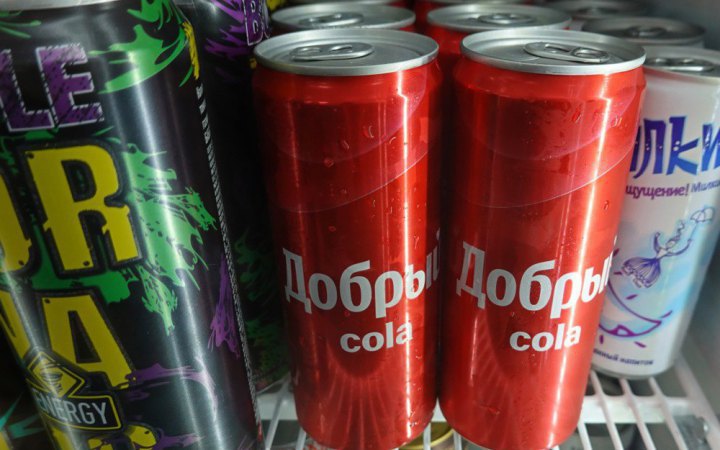Despite promises, Coca-Cola and dozens of other companies have not yet left the Russian market since the start of the great war, Bloomberg reports.
After Russia's full-scale invasion of Ukraine began in February 2022, Coca-Cola was one of the first multinationals to promise to leave Russia in protest.
Two years later, Coca-Cola's distinctive red logo is still easy to find in supermarkets and restaurants across the country. And with a new product called Dobryy Cola, which comes in cans with an extremely familiar red hue and taste that few people can distinguish from the original, by some measures the brand remains the leading producer of carbonated drinks in Russia.
That's because Multon Partners, the country's Coca-Cola producer, is owned by a separate company called Coca-Cola HBC, which is registered in London and in which the US parent company holds a 21% stake. When HBC ceased production of Coca-Cola after the invasion, Multon introduced Good Cola. The brand has become the country's most popular soda, with a 13% market share. "The profits from Coca-Cola in Russia simply went to Coca-Cola HBC, which gained market share through the success of Dobryy," says Garrett Nelson, an analyst at CFRA Research.
And Coca-Cola itself is still widely available, imported from neighbours such as Georgia and Kazakhstan. After the full-scale invasion of Ukraine, Russia passed a law allowing the sale of branded goods without the consent of the brand owner. These imports alone have made Coca-Cola the 3rd largest carbonated sweet drink in Russia with 6% of the market.
Coca-Cola is not the only company that has made an incomplete exit from Russia. PepsiCo Inc. announced in September 2022 that it would stop producing and selling Pepsi, Mountain Dew and 7Up, and its market share fell. But soon after, Pepsi added a new cola, Evervess, and increased production of Frustyle (similar to fruity Mirinda) at half a dozen plants in the country. Last year, beverage sales at the Russian unit jumped 12% to 209 billion rubles ($2.3 billion), according to its reports to local tax authorities. Last year, revenues from baby food and dairy products rose 10% to 129 billion rubles. PepsiCo declined to comment.
According to a study by the Yale School of Management, since 2022, more than 1,000 multinationals have announced that they are winding down their business in Russia. But many have stayed. Unilever Plc and Nestlé SA, having large production facilities there, did not want to sell them at the big discount the Kremlin demanded as an exit tax. The assets of Danish brewer Carlsberg AS and yoghurt giant Danone SA were seized when they tried to leave the market, although Danone eventually agreed to sell the company. French supermarket operator Auchan, clothing retailer Benetton Group, and restaurant chains Subway and TGI Fridays continue to operate in Russia with no apparent plans to downsize.








